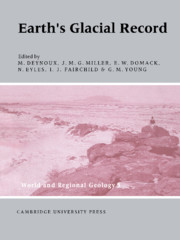Book contents
- Frontmatter
- Contents
- List of contributors
- Preface
- Acknowledgements
- 1 Geodynamic controls on glaciation in Earth history
- 2 Glacial-marine facies in a continental rift environment: Neoproterozoic rocks of the western United States Cordillera
- 3 The Neoproterozoic Konnarock Formation, southwestern Virginia, USA: glaciolacustrine facies in a continental rift
- 4 Glaciogenic deposits of the Permo-Carboniferous Dwyka Group in the eastern region of the Karoo Basin, South Africa
- 5 Itararé Group: Gondwanan Carboniferous-Permian of the Paraná Basin, Brazil
- 6 The interpretation of massive rain-out and debris-flow diamictites from the glacial marine environment
- 7 Neoproterozoic tillite and tilloid in the Aksu area, Tarim Basin, Uygur Xinjiang Autonomous Region, Northwest China
- 8 Lithology, sedimentology and genesis of the Zhengmuguan Formation of Ningxia, China
- 9 Architectural styles of glacially influenced marine deposits on tectonically active and passive margins
- 10 Marine to non-marine sequence architecture of an intracratonic glacially related basin. Late Proterozoic of the West African platform in western Mali
- 11 The enigmatic Late Proterozoic glacial climate: an Australian perspective
- 12 Isotopic signatures of carbonates associated with Sturtian (Neoproterozoic) glacial facies, central Flinders Ranges, South Australia
- 13 Reactive carbonate in glacial systems: a preliminary synthesis of its creation, dissolution and reincarnation
- 14 A Permian argillaceous syn- to post-glacial foreland sequence in the Karoo Basin, South Africa
- 15 A palaeoenvironmental study of black mudrock in the glacigenic Dwyka Group from the Boshof-Hertzogville region, northern part of the Karoo Basin, South Africa
- 16 Late Paleozoic post-glacial inland sea filled by fine-grained turbidites: Mackellar Formation, Central Transantarctic Mountains
- 17 Ice scouring structures in Late Paleozoic rhythmites, Paraná Basin, Brazil
- 18 Soft-sediment striated surfaces and massive diamicton facies produced by floating ice
- 19 Environmental evolution during the early phase of Late Proterozoic glaciation, Hunan, China
5 - Itararé Group: Gondwanan Carboniferous-Permian of the Paraná Basin, Brazil
Published online by Cambridge University Press: 06 July 2010
- Frontmatter
- Contents
- List of contributors
- Preface
- Acknowledgements
- 1 Geodynamic controls on glaciation in Earth history
- 2 Glacial-marine facies in a continental rift environment: Neoproterozoic rocks of the western United States Cordillera
- 3 The Neoproterozoic Konnarock Formation, southwestern Virginia, USA: glaciolacustrine facies in a continental rift
- 4 Glaciogenic deposits of the Permo-Carboniferous Dwyka Group in the eastern region of the Karoo Basin, South Africa
- 5 Itararé Group: Gondwanan Carboniferous-Permian of the Paraná Basin, Brazil
- 6 The interpretation of massive rain-out and debris-flow diamictites from the glacial marine environment
- 7 Neoproterozoic tillite and tilloid in the Aksu area, Tarim Basin, Uygur Xinjiang Autonomous Region, Northwest China
- 8 Lithology, sedimentology and genesis of the Zhengmuguan Formation of Ningxia, China
- 9 Architectural styles of glacially influenced marine deposits on tectonically active and passive margins
- 10 Marine to non-marine sequence architecture of an intracratonic glacially related basin. Late Proterozoic of the West African platform in western Mali
- 11 The enigmatic Late Proterozoic glacial climate: an Australian perspective
- 12 Isotopic signatures of carbonates associated with Sturtian (Neoproterozoic) glacial facies, central Flinders Ranges, South Australia
- 13 Reactive carbonate in glacial systems: a preliminary synthesis of its creation, dissolution and reincarnation
- 14 A Permian argillaceous syn- to post-glacial foreland sequence in the Karoo Basin, South Africa
- 15 A palaeoenvironmental study of black mudrock in the glacigenic Dwyka Group from the Boshof-Hertzogville region, northern part of the Karoo Basin, South Africa
- 16 Late Paleozoic post-glacial inland sea filled by fine-grained turbidites: Mackellar Formation, Central Transantarctic Mountains
- 17 Ice scouring structures in Late Paleozoic rhythmites, Paraná Basin, Brazil
- 18 Soft-sediment striated surfaces and massive diamicton facies produced by floating ice
- 19 Environmental evolution during the early phase of Late Proterozoic glaciation, Hunan, China
Summary
Abstract
Glacial deposits have recently been attracting the attention of petroleum geologists. Oman has about 3.5 billion bbl of oil in place in Carboniferous Gondwanan glacial sandstones; Bolivia produces about 10 MMbbl (oil and gas) annually, approximately 70% comes from Carboniferous glacial deposits: Australia has 22 gas fields in glacial Early Permian reservoirs.
The Paraná Basin in Brazil has the largest Gondwanan Carboniferous-Permian deposits, covering more than 700000 km2. To date the Itararé Group has had several gas finds and some subcommercial gas production. Currently, Petrobrás, the Brazilian oil company, is putting a great deal of effort, mostly seismic surveys and some drilling, in an attempt to find commercial hydrocarbons in the Paraná Basin. Being an important target in this exploratory process the Itararé Group deserves detailed study aiming at sand body geometry (reservoir-rocks), diamictite distribution (seal-rocks) and their trapping mechanisms. The main purpose of this paper is to present an overview of the stratigraphy and hydrocarbon potential of the Itararé Group based upon well logs, core description, and outcrop information.
The Itararé Group is subdivided into three main formations: Lagoa Azul, Campo Mourāo, and Taciba. A red bed unit, called the Aquidauana Formation, predominates in the northern realm of the Paraná Basin.
Introduction
The Paraná Basin is located in southern Brazil with extensions into Argentina, Paraguay, and Uruguay. In Brazil alone it covers an area of approximately 1000000 km2 (Fig. 5.1).
The Itararé Group is probably the most continuous and thickest temperate glacial-marine sequence in South American Gondwana. It covers an area larger than 700000 km2 and it is thicker than 1300 m in the central part of the Paraná Basin (Fig. 5.2).
- Type
- Chapter
- Information
- Earth's Glacial Record , pp. 70 - 82Publisher: Cambridge University PressPrint publication year: 1994
- 1
- Cited by

